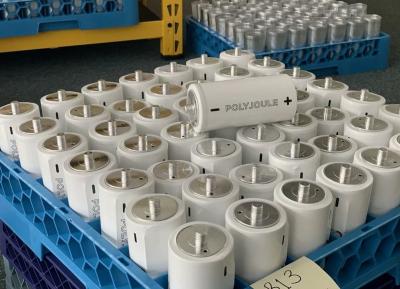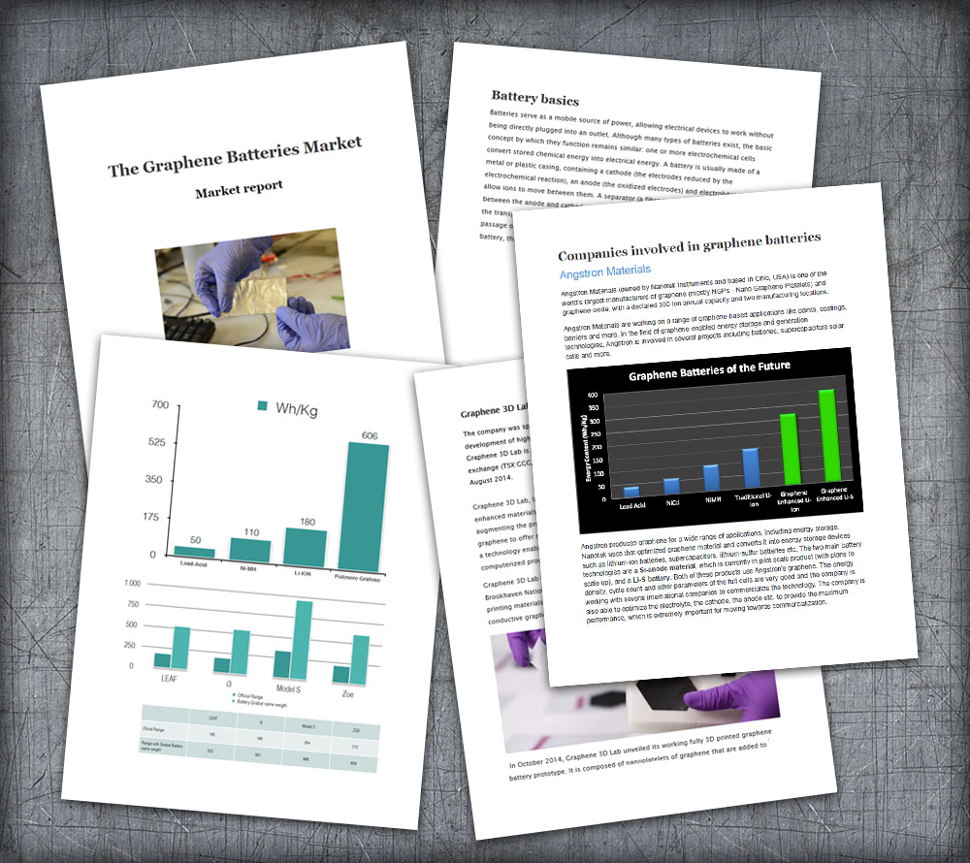Graphene batteries: Introduction and Market News - Page 12
Pleione Energy works with ESA on graphene-enhanced Li-ion batteries
Greece-based Pleione Energy has worked with ESA on a project to industrialize the production of Li-ion battery electrodes incorporating graphene as their main active material, producing in the tens of meters at a time.

These negative electrodes were used for Li-ion battery cells that were produced and tested according to European Cooperation for Space Standardization, ECSS, standards, representing space-ready quality.
Graphmatech, Graphenea, and Northvolt produce graphene oxide from recycled EV batteries
Graphmatech, Graphenea, and Northvolt have announced their success in up-cycling end-of-life EV batteries into graphene oxide at industrial pilot scale. This breakthrough uses the material left after Northvolt has extracted valuable metals and minerals. Until now, that remaining material was left as waste.
Emma Nehrenheim, Chief Environmental Officer of Northvolt, comments: The upcycling of graphene oxide from recycled batteries represents a great development in our pursuit of a sustainable battery industry in Europe. Batteries contain an abundance of valuable materials which we can recover to reduce our dependence on mining and producing fresh materials. We are proud to have contributed to this development.
We released a new edition of our Graphene Batteries Market Report
Today we published a new edition of our Graphene Batteries Market Report, with all the latest information. The batteries market is extremely active, as demand from EVs and mobile applications increases research and development efforts, and graphene is seen as a potential material to increase capacity, decrease charging times and improve other performance metrics.
Reading this report, you'll learn all about:
- The advantages of using graphene in batteries
- The different ways graphene can be used in batteries
- Various types of graphene materials
- What's on the market today
The report package also provides:
- A list of all graphene companies involved with batteries
- Detailed specifications of graphene-enhanced anode materials
- Personal contact details into most graphene developers
- Free updates for a year
This Graphene Batteries market report provides a great introduction to graphene materials used in the batteries market, and covers everything you need to know about graphene in this niche. This is a great guide for anyone involved with the battery market, nanomaterials, electric vehicles and mobile devices.
GMG commissions G+AI pouch cell equipment and manufactures the first pouch cell format batteries
Graphene Manufacturing Group (GMG) has announced that it has commissioned its graphene aluminium-ion batteries in pouch cell format and that the first G+Al battery pouch cells have been manufactured.
With the addition of the pouch cell equipment to the existing pilot production and testing plant, GMG has made the Battery Development Centre operational, to enable the manufacturing of this technology for a wide variety of applications.
India-based Nordische Technologies and CIPET announce aluminium-graphene battery for gadgets and EV technology
India-based start-up, Nordische Technologies, claims to have launched an Aluminium-Graphene pouch cell battery for consumer electronics, gadgets and future EV technology in association with the Central Institute of Petrochemicals Engineering and Technology (CIPET), Bengaluru.
The company said in a statement that the Aluminum-Graphene pouch cell battery is the world's fastest charging, non-toxic, non-flammable, and non-lithium non-cobalt battery with a long cycle life.
GMG and Rio Tinto enter agreement for energy storage solutions
Graphene Manufacturing Group (GMG) has announced that it and Rio Tinto Group have signed a non-binding agreement to collaborate on energy saving and storage solutions. Rio Tinto is a mining and metals company that operates in 35 countries.
Together, GMG and Rio Tinto will explore the use of energy saving products in Rio Tinto's operations, explore working together to support GMG's development of Graphene Aluminium-Ion ("G+Al") batteries, and collaborate on mining and other industrial applications.
PolyJoule unveils graphene-enhanced polymer batteries
PolyJoule, a spin-off of the Massachusetts Institute of Technology (MIT), recently unveiled a new battery technology based on its own proprietary conductive polymers and other organic, non-metallic materials.

The battery cells were reportedly tested to perform for 12,000 cycles at 100% depth of discharge. The device is based on a standard, two-electrode electrochemical cell containing the conductive polymers, a carbon-graphene hybrid, and a non-flammable liquid electrolyte. Alternating anodes and cathodes are interwoven and then connected in parallel to form a cell.
Korean researchers fabricate nitrogen and sulfur co-doped graphene nanoribbons for enhanced potassium batteries
A research team, led by Professor Yu Seung-ho of the Department of Chemical and Biological Engineering at Korea University, Seoul National University's Professor Yuanzhe Piao and Sogang University's Professor Back Seo-in, has fabricate nitrogen and sulfur co-doped graphene nanoribbons with stepped edges, elucidating the migration barrier and enhancing the electrochemical performance of potassium batteries.

Potassium has shown promise for large-capacity non-lithium battery cells, because it is affordable, abundant, and has a low redox potential (-2.93V) close to that of lithium ion (-3.04V). Carbon-based nanomaterials, which are chemically stable and lightweight, are popular anode materials used in potassium batteries. However, the high energy barrier between electrochemical intercalation and deintercalation of potassium ions induces adsorption/desorption reactions, resulting in the storage of potassium ions only on the surface of carbon and lowering the energy density during battery assembly. As such, the smooth intercalation/deintercalation of potassium is extremely important in obtaining high-performance potassium batteries.
Advanced Material Development selected for the Faraday Battery Challenge Investment
Advanced Material Development recently announced its selection as one of eleven SME’s for the 2022 Faraday Investment Program. The program will invest up to £330 million in research and innovation projects and facilities to promote the battery business in the UK.
Through its expertise in 2D nanomaterials, AMD has been able to produce a variety of robust printed structures for electrodes, strain sensing and thermal interfaces that show improved conductivity and mechanical flexibility whilst dramatically improving sustainability.
Zero Emissions Developments seeks funding to establish graphene-based solar battery manufacturing plant
Zero Emissions Developments (ZED) is an Australia-based company that has announced the development of a technology to build longer lasting, greener, more efficient and more affordable graphene-based solar and EV batteries. It is now seeking AUD$30 million (around USD$22,300,000) in private investment to build a manufacturing plant that will produce these batteries.
The planned manufacturing plant will produce the PowerCap batteries in southeast Queensland through the entity, PowerCap Un Ltd.
Pagination
- Previous page
- Page 12
- Next page
